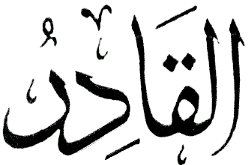



According to Dr Sharib:
"Al-Qadir is the One Whose order is absolute and Who enforces His
order as He wills."
To emulate the name we are told we should renounce the pleasures of
life, control our self, trust in Allah, and not trust in or rely upon our own
planning, intelligence or skills.
Appropriate recitation is sure to humiliate one's enemies; prevent one
being made captive by a tyrant or being overpowered by enemies; or
during some time of difficulty solves the difficulty.
see 'The 99 Most Beautiful Names of Allah' by Dr Zahurul Hassan Sharib
Some other references:
hey say: "Why is not
A Sign sent down
To him from his Lord?"
Say: "Allah hath certainly
Power to send down a Sign:
But most of them
Understand not."
Al-Ghazali describes this name along with Al-Muqtadir.
He says - "The All-Powerful is one Who does what He wills, or does not
act if He so wills, and is not conditioned as to will necessarily.
So far as man goes Al-Ghazali says that he has some power in a general
sense but only attains some possibilities.
(Al-Ghazali - The Ninety-nine Beautiful Names of God. Trans. Burrel/Daher: ITS: 1992.)
"The manifestation of Allah's power is spoken of as "Allah's hand".
(The Most Beautiful Names: Sheikhs. Tosun Bayrak al-Jerrahi al-Halveti . Threshold. 1985)
In the case of the Qur'anic verse above the name is mentioned in
connection with a kind of challenge, by the doubting people, for Allah to
send a Sign. But Allah acts according to His own will, in His own way, and
at His own time, to His own plan and not in response the actions or
expectations of man - unless these conform with what He wills.
In human terms the difficulty of acting purely by one's own will may be
seen if we (for example) take a box and try to decide to either open it or
not open it - entirely according to our own will, unconditioned by any
external or internal influence except our own will. If we are attentive we will
become aware of hundreds of hidden impulses - such as impatience,
reason, tiredness, hunger, curiosity, boredom, doubt etc. that condition
our apparent act of free will. These impulses and motivations thus are
seen to hold our will in chains.
To be free from this tyranny of our own nature implies submission of our
will to the Divine will. Mevlana Rumi says:-
"O son, burst thy chains and be free! How long wilt thou be a bondsman
to silver and gold?"
(JMZ)
"Al-Qadir is the One Whose order is absolute and Who enforces His
order as He wills."
To emulate the name we are told we should renounce the pleasures of
life, control our self, trust in Allah, and not trust in or rely upon our own
planning, intelligence or skills.
Appropriate recitation is sure to humiliate one's enemies; prevent one
being made captive by a tyrant or being overpowered by enemies; or
during some time of difficulty solves the difficulty.
see 'The 99 Most Beautiful Names of Allah' by Dr Zahurul Hassan Sharib
Some other references:
hey say: "Why is not
A Sign sent down
To him from his Lord?"
Say: "Allah hath certainly
Power to send down a Sign:
But most of them
Understand not."
Al-Ghazali describes this name along with Al-Muqtadir.
He says - "The All-Powerful is one Who does what He wills, or does not
act if He so wills, and is not conditioned as to will necessarily.
So far as man goes Al-Ghazali says that he has some power in a general
sense but only attains some possibilities.
(Al-Ghazali - The Ninety-nine Beautiful Names of God. Trans. Burrel/Daher: ITS: 1992.)
"The manifestation of Allah's power is spoken of as "Allah's hand".
(The Most Beautiful Names: Sheikhs. Tosun Bayrak al-Jerrahi al-Halveti . Threshold. 1985)
In the case of the Qur'anic verse above the name is mentioned in
connection with a kind of challenge, by the doubting people, for Allah to
send a Sign. But Allah acts according to His own will, in His own way, and
at His own time, to His own plan and not in response the actions or
expectations of man - unless these conform with what He wills.
In human terms the difficulty of acting purely by one's own will may be
seen if we (for example) take a box and try to decide to either open it or
not open it - entirely according to our own will, unconditioned by any
external or internal influence except our own will. If we are attentive we will
become aware of hundreds of hidden impulses - such as impatience,
reason, tiredness, hunger, curiosity, boredom, doubt etc. that condition
our apparent act of free will. These impulses and motivations thus are
seen to hold our will in chains.
To be free from this tyranny of our own nature implies submission of our
will to the Divine will. Mevlana Rumi says:-
"O son, burst thy chains and be free! How long wilt thou be a bondsman
to silver and gold?"
(JMZ)







| Bismillah ir Rehman ir Rahim |

| Al-Qadir (Al-Qaadir) Qur'an 6:37 |
| The Able The Capable, He Who Does as He Pleases, The Powerful, The All-powerful, TheAll-determined, The One Who Has the Ability to Evaluate Everything |
Wa qaaluu law laa nuzzila 'alayhi
'Aayatum-mir-Rabbih? Qul
'innallaaha Qaa-dirun 'alaaa
'any-yunazzila 'Aaya-tanw-wa
laakinna 'aksarahum laa
ya'-lamuun.
(Qur'an 6:37)
'Aayatum-mir-Rabbih? Qul
'innallaaha Qaa-dirun 'alaaa
'any-yunazzila 'Aaya-tanw-wa
laakinna 'aksarahum laa
ya'-lamuun.
(Qur'an 6:37)


